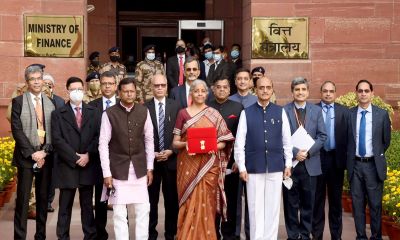The Budget focuses on custom tariff simplification, custom duty reduction, increased capex investment, incentives to manufacturing entities, government contribution to R&D, conversion of coals to chemicals, and widespread usage of Kisan drones

The Union Budget 2022 -23 seeks to lay the foundation and give a blueprint to steer the economy over the Amrit Kaal of the next 25 years – from India at 75 to India at 100, said Union Minister for Finance and Corporate Affairs, Nirmala Sitharaman while presenting the Union Budget 2022-23 in Parliament today.
The Finance Minister announced four priorities which includes: PM GatiShakti; Inclusive Development, Productivity enhancement & investment, Sunrise opportunities; Energy transition and Climate action; and financing of investments.
Let's look at the Budget and its relevance to Indian chemicals, petrochemicals, and energy sectors.
Review of Custom Exemptions and Tariff Simplification
Sitharaman said that after extensive consultations along with crowd sourcing the government proposes to phase out more than 350 exemption entries. These include exemption on certain agricultural produce, chemicals, fabrics, medical devices, drugs among others.
Further, she said that as a simplification measure, several concessional rates are being incorporated in the Customs Tariff Schedule itself instead of prescribing them through multiple notifications. This review would simplify customs rate and tariff structure particularly in sectors such as chemicals, textiles and metals, and minimise disputes.
She added that removal of exemption on items which are or can be manufactured in India and providing concessional duties on raw material that go into manufacturing of intermediate products will go many steps forward in achieving our objective of ‘Make in India’ and ‘Atmanirbhar Bharat’.
Custom Duty Reduction
She announced that to enhance domestic value addition, the government proposes to reduce the customs duty on certain critical chemicals namely, Methanol, Acetic Acid and heavy feed stocks for petroleum refining, while increasing the duty on sodium cyanide for which adequate domestic capacity exists.
Promoting Blending of Fuel
Sitharaman said that blending of fuel is a priority for the government. To promote blending of fuel, the government proposes to charge an additional differential excise duty of Rs. 2 per litre from 1st October 2022 on unblended fuel.
Chemical-free Natural Farming and Kisan Drones
The budget focused on natural farming devoid of any chemical use. The Finance Minister said, “Chemical-free Natural Farming will be promoted throughout the country, with a focus on farmers’ lands in 5-km wide corridors along river Ganga, at the first stage”. The Finance Minister said that the use of ‘Kisan Drones’ will be promoted for crop assessment, digitization of land records, spraying of insecticides, and nutrients.
Incentives to Newly Incorporated Manufacturing Entities
Sitharaman said that to establish a globally competitive business environment, a concessional tax regime of 15 per cent tax was introduced by the Government for certain newly incorporated domestic manufacturing companies. The government proposes to extend the last date for commencement of manufacturing or production under section 115 BAB by one year to 31st March, 2024 from 31st March, 2023.
Government Contribution in R&D
Finance Minister highlighted that for R&D in these sunrise opportunities like: Artificial Intelligence (AI), Geospatial Systems and Drones, Semiconductor and its ecosystem, Space Economy, Genomics and Pharmaceuticals, Green Energy, and Clean Mobility Systems in addition to efforts of collaboration among academia, industry and public institutions, government contribution will be provided. These will provide employment opportunities for youth and also make Indian industry more efficient and competitive.
Battery Swapping Policy
Highlighting the constraint of space in urban areas for setting up charging stations at scale, the Finance Minister announced the proposal of bringing out Battery Swapping Policy and interoperability standards. The private sector will be encouraged to develop sustainable and innovative business models for Battery or Energy as a Service, added Sitharaman.
Energy Transition and Climate Change
The Finance Minister has proposed an additional allocation of Rs. 19,500 crore for Production Linked Incentive (PLI) Scheme for manufacture of high efficiency solar modules. This will also ensure the domestic manufacturing required for achieving the ambitious goal of 280 GW of installed solar capacity by 2030. The Circular Economy transition is expected to help in productivity enhancement as well as creating large opportunities for new businesses and jobs, the Union Minister said while highlighting the importance of Circular Economy.
Transition to Carbon Neutral Economy
Co-firing of five to seven per cent biomass pellets in thermal power plants has been proposed by the Union Minister that will result in CO2 savings of 38 MMT annually. Energy efficiency and saving measures through the setting up of the Energy Service Company (ESCO) business model in large commercial buildings will also facilitate capacity building and awareness for energy audits, performance contracts, and common measurement & verification protocol.
Four pilot projects for coal gasification and conversion of coal into chemicals required for the industry have also been proposed to evolve technical and financial viability.
Customs National Portal to focus on facilitation
Customs administration of SEZs shall be fully IT driven, announced Nirmala Sitharaman while presenting the Union Budget 2022-23 in the Parliament today. She also said that the Customs National Portal will function with a focus on higher facilitation and with only risk based checks.
Capex investment of Rs. 10.68 lakh Cr
The outlay for capital expenditure is being stepped up sharply by 35.4% from Rs. 5.54 lakh crore in the current year to Rs. 7.50 lakh crore in 2022-23. This would be 2.9% of GDP in 2022-23. With capital expenditure taken together with the provision made for creation of capital assets through Grants-in-Aid to States, the effective capital expenditure is estimated at Rs. 10.68 lakh crore in 2022-23, which will be about 4.1% of GDP.
Sitharaman announced that sovereign Green Bonds would be issued for mobilizing resources for green infrastructure as a part of the government’s overall market borrowings in 2022-23. The proceeds would be deployed in public sector projects thereby reducing the carbon intensity of the economy.
Subscribe to our newsletter & stay updated.